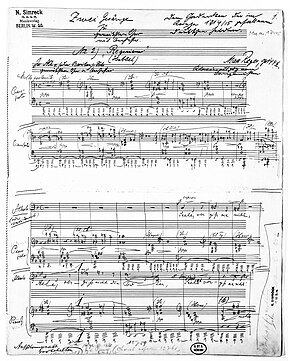| Requiem | |
|---|---|
| Choral composition by Max Reger | |
 First page from the autograph of the piano version of the Requiem, with title and dedication | |
| Key | D minor |
| Opus | 144b |
| Text | "Requiem" by Friedrich Hebbel |
| Language | German |
| Composed | 1915 |
| Dedication | Soldiers who fell in the War |
| Performed | 16 July 1916 |
| Published | 1916: by N. Simrock |
| Scoring | |
Max Reger's 1915 Requiem (or the Hebbel Requiem), Op. 144b, is a late Romantic setting of Friedrich Hebbel's poem "Requiem" for alto or baritone solo, chorus and orchestra. It is Reger's last completed work for chorus and orchestra, dedicated in the autograph as Dem Andenken der im Kriege 1914/15 gefallenen deutschen Helden (To the memory of the German heroes who fell in the 1914/15 War).
Reger had composed Requiem settings before: his 1912 motet for male chorus, published as the final part of his Op. 83, uses the same poem, and in 1914 he set out to compose a choral work in memory of the victims of the Great War. The setting is of the Latin Requiem, the Catholic service for the dead, but the work remained a fragment and was eventually designated the Lateinisches Requiem (Latin Requiem), Op. 145a.[1]
The Hebbel Requiem was published by N. Simrock in 1916, after the composer's death, with another choral composition, Der Einsiedler (The Hermit), Op. 144a, to a poem by Joseph von Eichendorff. That publication was titled Zwei Gesänge für gemischten Chor mit Orchester (Two songs for mixed chorus with orchestra), Op. 144. Reger provided a piano transcription of the orchestral parts. Max Beckschäfer arranged the work for voice, chorus and organ in 1985. The Hebbel Requiem was first performed in Heidelberg on 16 July 1916 as part of a memorial concert for Reger, conducted by Philipp Wolfrum.
Reger thought the Hebbel Requiem was "among the most beautiful things" he ever wrote.[2] It has been described as of "lyrical beauty, a dramatic compactness, and [of] economy of musical means"[3] in which the composer's "mastery of impulse, technique, and material is apparent".[3]
- ^ Institute 145a 2016.
- ^ Grim 2005.
- ^ a b Lenssen 2002.
